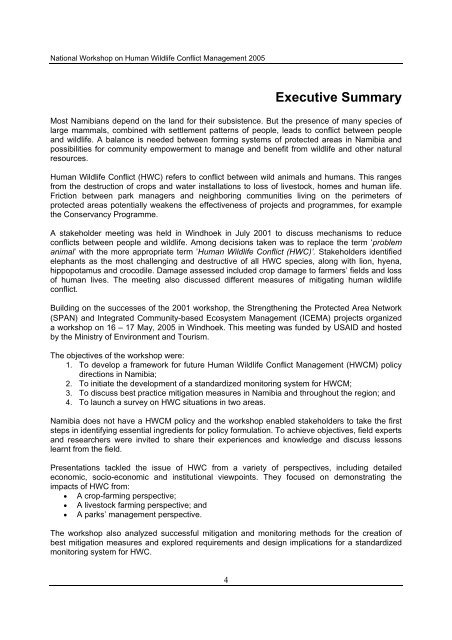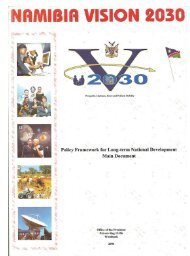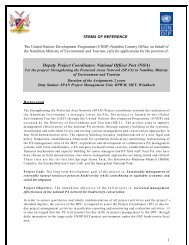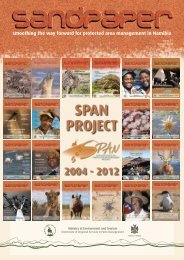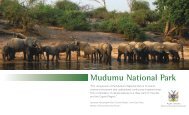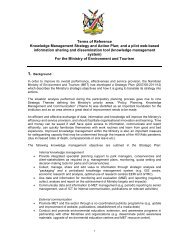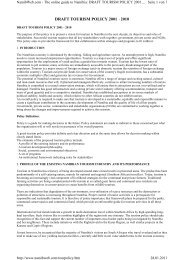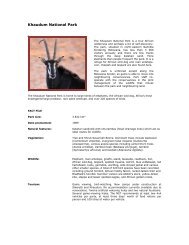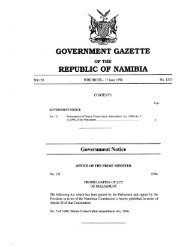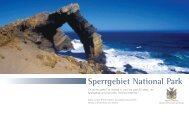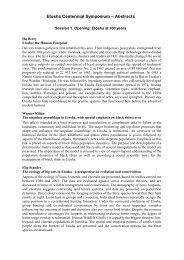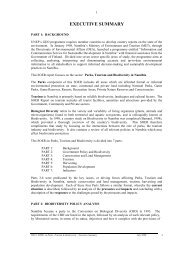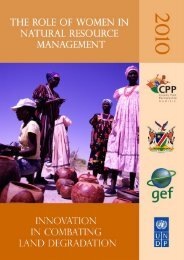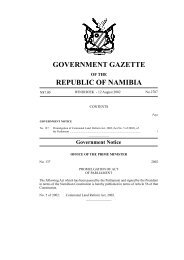HWCM - Ministry of Environment and Tourism
HWCM - Ministry of Environment and Tourism
HWCM - Ministry of Environment and Tourism
You also want an ePaper? Increase the reach of your titles
YUMPU automatically turns print PDFs into web optimized ePapers that Google loves.
National Workshop on Human Wildlife Conflict Management 2005<br />
Executive Summary<br />
Most Namibians depend on the l<strong>and</strong> for their subsistence. But the presence <strong>of</strong> many species <strong>of</strong><br />
large mammals, combined with settlement patterns <strong>of</strong> people, leads to conflict between people<br />
<strong>and</strong> wildlife. A balance is needed between forming systems <strong>of</strong> protected areas in Namibia <strong>and</strong><br />
possibilities for community empowerment to manage <strong>and</strong> benefit from wildlife <strong>and</strong> other natural<br />
resources.<br />
Human Wildlife Conflict (HWC) refers to conflict between wild animals <strong>and</strong> humans. This ranges<br />
from the destruction <strong>of</strong> crops <strong>and</strong> water installations to loss <strong>of</strong> livestock, homes <strong>and</strong> human life.<br />
Friction between park managers <strong>and</strong> neighboring communities living on the perimeters <strong>of</strong><br />
protected areas potentially weakens the effectiveness <strong>of</strong> projects <strong>and</strong> programmes, for example<br />
the Conservancy Programme.<br />
A stakeholder meeting was held in Windhoek in July 2001 to discuss mechanisms to reduce<br />
conflicts between people <strong>and</strong> wildlife. Among decisions taken was to replace the term ‘problem<br />
animal’ with the more appropriate term ’Human Wildlife Conflict (HWC)’. Stakeholders identified<br />
elephants as the most challenging <strong>and</strong> destructive <strong>of</strong> all HWC species, along with lion, hyena,<br />
hippopotamus <strong>and</strong> crocodile. Damage assessed included crop damage to farmers’ fields <strong>and</strong> loss<br />
<strong>of</strong> human lives. The meeting also discussed different measures <strong>of</strong> mitigating human wildlife<br />
conflict.<br />
Building on the successes <strong>of</strong> the 2001 workshop, the Strengthening the Protected Area Network<br />
(SPAN) <strong>and</strong> Integrated Community-based Ecosystem Management (ICEMA) projects organized<br />
a workshop on 16 – 17 May, 2005 in Windhoek. This meeting was funded by USAID <strong>and</strong> hosted<br />
by the <strong>Ministry</strong> <strong>of</strong> <strong>Environment</strong> <strong>and</strong> <strong>Tourism</strong>.<br />
The objectives <strong>of</strong> the workshop were:<br />
1. To develop a framework for future Human Wildlife Conflict Management (<strong>HWCM</strong>) policy<br />
directions in Namibia;<br />
2. To initiate the development <strong>of</strong> a st<strong>and</strong>ardized monitoring system for <strong>HWCM</strong>;<br />
3. To discuss best practice mitigation measures in Namibia <strong>and</strong> throughout the region; <strong>and</strong><br />
4. To launch a survey on HWC situations in two areas.<br />
Namibia does not have a <strong>HWCM</strong> policy <strong>and</strong> the workshop enabled stakeholders to take the first<br />
steps in identifying essential ingredients for policy formulation. To achieve objectives, field experts<br />
<strong>and</strong> researchers were invited to share their experiences <strong>and</strong> knowledge <strong>and</strong> discuss lessons<br />
learnt from the field.<br />
Presentations tackled the issue <strong>of</strong> HWC from a variety <strong>of</strong> perspectives, including detailed<br />
economic, socio-economic <strong>and</strong> institutional viewpoints. They focused on demonstrating the<br />
impacts <strong>of</strong> HWC from:<br />
• A crop-farming perspective;<br />
• A livestock farming perspective; <strong>and</strong><br />
• A parks’ management perspective.<br />
The workshop also analyzed successful mitigation <strong>and</strong> monitoring methods for the creation <strong>of</strong><br />
best mitigation measures <strong>and</strong> explored requirements <strong>and</strong> design implications for a st<strong>and</strong>ardized<br />
monitoring system for HWC.<br />
4


